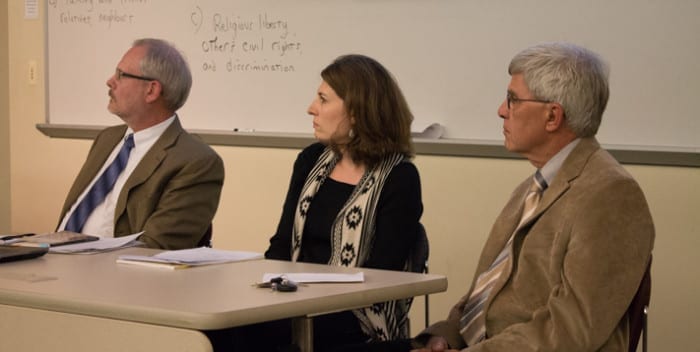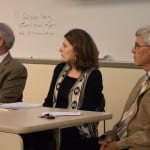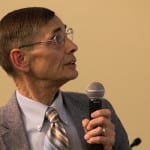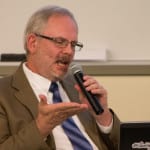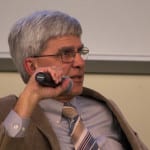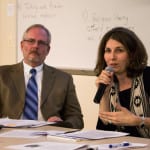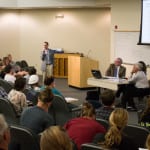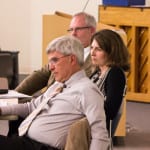Panel Addresses Same-Sex Marriage Legislation
by Abigail Wisniewski
On Oct. 6, students, faculty and community members filled the TLEC auditorium to hear a three-person panel discuss how the Supreme Court’s June 26 decision to legally recognize same-sex marriages will affect Christians.
The panel consisted of Assistant Professor of Theology Rev. Dr. Dirk Reek, Assistant Professor of Global Studies Tobin Beck and Seward public defender Christina Marroquin. The panel was moderated by Professor of Education and Psychology Dr. Russ Moulds.
One of the major questions the panel discussed was how Christians should react to the Supreme Court decision.
“Christian practice is not a matter of setting up a set of rules or absolutes beyond the Ten Commandments themselves, but Christian practice is a matter of informed strategies that are, in the long run, intended to advance the gospel of Jesus Christ… and we may change our strategies as times and circumstances change,” Moulds said.
This raised the question of what strategies can be used, as well as how Christians should act toward homosexuals. Panel members said this question has caused Christians to look at who they are as individuals and whether they look to God in forming their responses.
“You have to stand for your conscience,” Reek said.
The panel explained steps the church can take in shaping how Christians act toward homosexuals. Panel members said Christians are called to love people and aid others by helping them develop their convictions and explaining the Biblical approach to the issue in a loving manner.
“Love that person as hard as you can,” Marroquin said.
Moulds explained that judgment lies with God, not Christians. Instead, Christians are called to use spiritual assessment in helping others evaluate their actions.
Members of the Concordia community questioned what the Supreme Court decision may mean for Concordia and other religious colleges and institutions. Since the decision was made a few months ago, there is speculation over what the consequences may be.
“I don’t think we need the government’s permission to confess [that] the Lord established us, not the government…. I don’t know entirely what that means for those who make decisions in this place,” Reek said.
One issue Concordia may face is whether, as a Christian institution, the university will have to decide between maintaining policies in line with religious beliefs or keeping state funding.
There is also question over how Concordia would potentially handle a same-sex couple applying to live together and the housing of homosexuals.
Although there is limited documentation on how to respond to specific issues, Moulds said, “We don’t need additional documentation, we already have our documentation in the Scriptures.”
Moulds explained that much of the issue is an exegetical matter, meaning that it depends on how one understands the Biblical texts regarding same-sex marriage.
While there may still be questions about how Christians should approach the Supreme Court decision as individuals, Moulds also noted that as an institution, the Lutheran Church—Missouri Synod will not support same-sex marriage since the Bible, the source of LCMS beliefs, does not support same-sex marriage.
The Supreme Court decision established marriage as a right regardless of sexual orientation.
“Marriage is not a right,” Reek said. “Christians don’t have rights. Christians live in service. Period. When you and I pursue rights, that’s idolatrous, and that’s not the Lord.”
The panel discussion was held to help individuals identify the issues and the questions Christians should ask themselves when developing a stance on same-sex marriage. It is still unknown how the decision will affect Concordia in the future.
“I don’t think there’s an answer yet,” Moulds said.


